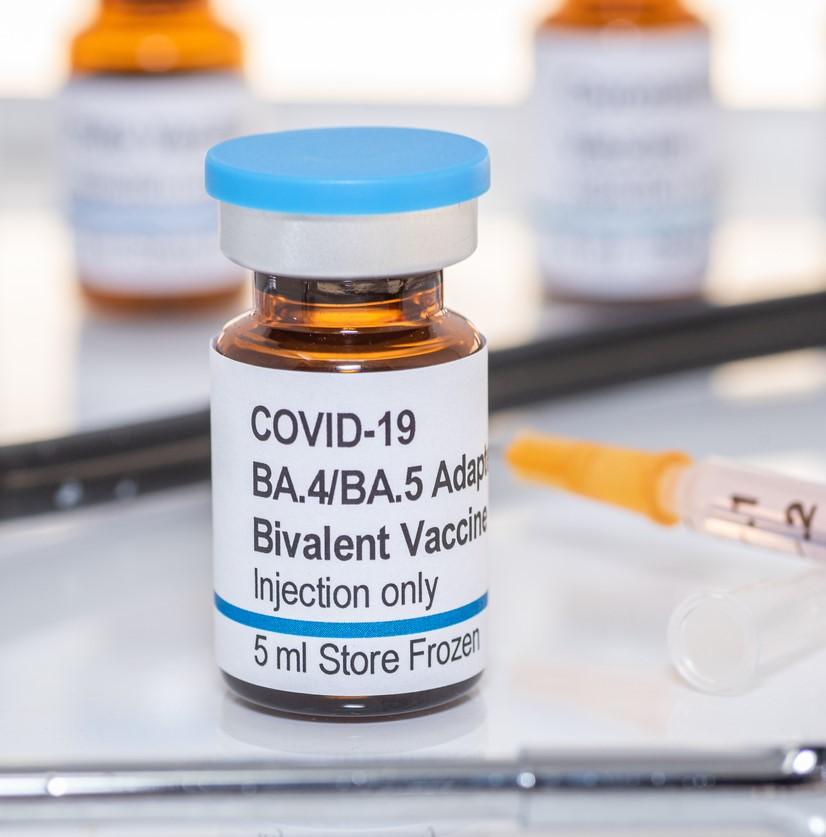Authors writing this week in the New England Journal of Medicine and The Lancet Infectious Diseases shared new evidence on the durability and efficacy of bivalent (two-strain) COVID-19 boosters. The vaccines offer strong protection against hospitalization and death during the post-Omicron era, but protection wanes relatively quickly.
The New England Journal of Medicine study is from a team at the University of North Carolina–Chapel Hill (UNC) and provides 2 additional months of data on bivalent COVID vaccine effectiveness (VE) among North Carolina residents.
Bivalent boosters developed by Pfizer and Moderna were initially designed to target the BA.4 and BA.5 strains of Omicron, the highly infectious strain of SARS-CoV-2 that began circulating in the winter of 2021-22 in the United States. Introduced in September 2022, the bivalent boosters replaced monovalent (one-strain) boosters for Americans 12 years and older.
The UNC research team previously published results on VE of the boosters from September 1 to December 8, 2022, when the Omicron strains were the predominant circulating strains.
Protection drops within 5 months
The goal in the previous and current studies were to measure the effectiveness of one additional dose of bivalent vaccine against four outcomes: infection, severe infection resulting in hospitalization, severe infection resulting in hospitalization or death, and severe infection resulting in death.
The additional 2 months of data, collected from December 2022 to February 2023, show how the bivalent vaccines perform when the BQ.1/BQ.1.1 and XBB/XBB.1.5 Omicron subvariants have become the most prevalent. Results were based on 6,306,311 North Carolinians who were eligible to receive bivalent boosters; of these residents, 1,279,802 received the injections.
The authors found VE against hospitalization or death was 67.4% after 2 weeks but decreased to 47.5% after 4 weeks and to 38.4% after 5 months. In general, effectiveness against infection was higher for the Moderna bivalent vaccine than for the Pfizer-BioNTech bivalent vaccine and higher among previously infected participants than among those with no previous infection.
In a press release on the study, author Danyu Lin, PhD, said, "The findings from our study were encouraging, because the bivalent vaccines to be developed this year will likely be deployed against variants that emerge later."
In Israeli, good VE against hospitalization, death
A study from Israel published in The Lancet Infectious Diseases and presented at the European Society of Clinical Microbiology and Infectious Diseases (ECCMID) found a 72% VE against hospitalization and a 68% VE against death for the Pfizer bivalent COVID vaccine in adults 65 years and older.
Lead study author Ronen Arbel, PhD, MBA, of Clalit Health Services in Tel Aviv, told CIDRAP News that the study did not account for VE against infection.
"Infection data since Omicron started is underreported and incomplete," Arbel said. "Many infections are asymptomatic. Moreover, even patients with light symptoms may not test for COVID. Therefore, all our studies since 2022 are focused on hospitalizations and mortality outcomes, which are measurable and clinically significant."
Infection data since Omicron started is underreported and incomplete.
The Israeli study measured hospitalization and deaths from September 27, 2022, to January 25, 2023, among 569,519 eligible participants seen at Clalit Health Services. Of those, 134,215 participants (24%) received a bivalent mRNA booster vaccination during the study period.
Thirty-two participants who received a bivalent mRNA booster vaccination and 541 who did not were hospitalized during the study period, making the adjusted risk for COVID-19 hospitalizations in the bivalent mRNA booster recipients 0.035%, versus 0.124% in the non-recipients.
Thirteen study participants who received a bivalent mRNA vaccination and 172 who did not receive a bivalent booster died during the study. The absolute risk reduction for deaths due to COVID-19 in bivalent mRNA booster recipients versus non-recipients was 0.027% (95% CI 0.017–0.032), and the number needed to vaccinate to prevent one death due to COVID-19 was 3,722 people (95% CI 3086–6026), the authors said.
'Primary tool' for avoiding severe COVID-19
"Bivalent mRNA booster vaccination in adults aged 65 years or older is an effective and essential tool to reduce their risk of hospitalisation and death due to COVID-19. Vaccination remains the primary tool for avoiding severe COVID-19," Arbel said in a press release on the study.
In a commentary on the study, Anna Stoliaroff-Pepin, and Thomas Harder, MD, both of the Robert Koch Institute in Berlin, said the Israeli study echoed findings in the United States and Northern Europe, which provide real-world evidence that bivalent boosters reduce both hospitalizations and death due to COVID-19.
They caution, however, that studying the VE of bivalent boosters is complicated, and studies must take into account how many and which type of boosters study participants have already received.
"The number of vaccine doses and waning of vaccine effectiveness over time can influence estimates substantially," they write.




















